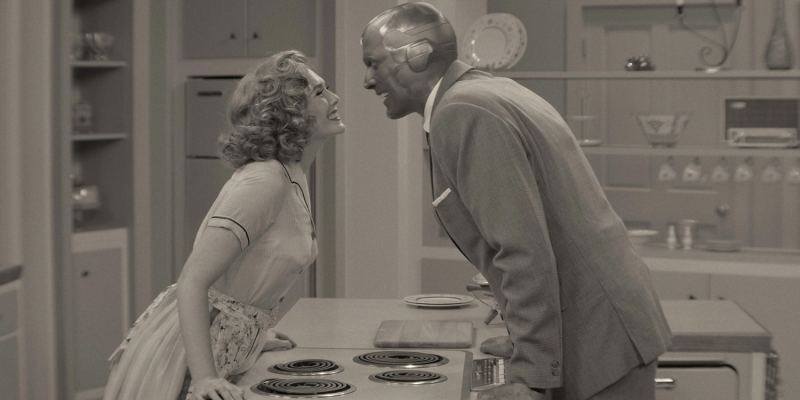In October 1996, one of America’s premier cable networks made a promise that became a hallmark slogan: “It’s not TV. It’s HBO.” The implication was that the company was offering something better than television. A quarter of a century later, things have changed. With the premiere of WandaVision, Marvel Studios makes its own bold statement: “Actually, it is TV.”
WandaVision does not mark the Marvel Cinematic Universe’s first foray into live-action television. Agents of S.H.I.E.L.D. and Agent Carter both aired on terrestrial network television, on ABC. Netflix launched its own weird satellite corner of the shared universe with shows like Daredevil and Jessica Jones. However, these were very clearly side projects. WandaVision marks the first time that a television series has been tasked with carrying the brand forward.
Part of this is accidental. Had the pandemic never happened, WandaVision would not serve as the launchpad of the company’s long-delayed “Phase 4.” That honor would have gone to the now delayed theatrical releases of Black Widow and The Eternals. However, there is an understanding that the pandemic accelerated already appreciable trends. Even before the pandemic, streaming had become the “biggest priority” for Marvel’s parent company, Disney. Now it is even more urgent.
The understanding that “Phase 4” would launch on Disney+ rather than in theaters came with a small, but interesting, shift. Originally, the streaming shows were to launch with The Falcon and the Winter Soldier, focusing on the characters from the Captain America film franchise. However, the schedule was shifted slightly so that WandaVision would go first, effectively kicking off a six-month block of Marvel shows, running through The Falcon and the Winter Soldier and wrapping with Loki.

Watching WandaVision, it is obvious why the schedule was adjusted. The repositioning of WandaVision feels like a clear statement of intent. It also draws a clear line in the sand between the company’s previous experiments with tie-in television. Agents of S.H.I.E.L.D. and Agent Carter often felt ancillary to the feature films. Similarly, critics (and even star Charlie Cox) often described Netflix shows like Daredevil as “a thirteen-hour movie,” as if porting the storytelling style directly from cinema.
In contrast, WandaVision is very clearly designed as television. As much as the title is an amalgamation of the names of the title characters Wanda Maximoff (Elizabeth Olsen) and Vision (Paul Bettany), it is also a play on the idea of television. The series is constructed as a loving homage to the medium’s history, with both available episodes opening with title sequences that recall classic sitcoms like The Dick Van Dyke Show or Bewitched and closing with the camera pulling out of a television set.
WandaVision speaks the language of the medium that it emulates. The opening episodes are shot in black and white in a 4:3 aspect ratio, a firm rejection of any push to ape the conventions of modern blockbuster cinema. The premiere was shot in front of a live studio audience. Scenes transition through old-fashioned wipes and fades. At one point, Wanda rewinds the tape to reset a scene. During turbulent shifts, the footage ripples as if being edited on video like a lot of shows of the era.
The two premiere episodes are broken up by faux advertisements for Stark Industries and Strucker Watches, catchy theme songs, and animated interludes. The setups are lifted directly from old sitcom plots, with the premiere focusing on a comedic misunderstanding when Vision invites his boss, Mr. Hart (Fred Melamed), to dinner, while the second episode finds a neighborhood talent show going spectacularly awry. Even Agnes (Kathryn Hahn) is portrayed as the wacky sitcom neighbor.

Indeed, WandaVision mines this setup for compelling dramatic tension. The alienness of the format pushes the show into the uncanny. Repeatedly throughout WandaVision, both Wanda and Vision are pushed against the constraints of the classic television sitcom, like the lack of continuity or genericity of the premise. Neither can remember their lives before arriving in this status quo or recall when they got married. They are trapped in a continuity-free, syndication-ready perpetual now.
Vision works a vague number-crunching job, like Chandler Bing (Matthew Perry) in Friends, but he is the only person bothered that nobody can tell him what the company actually does. When dinner with the boss takes a dark turn, the combination of sitcom tropes and panicked intensity evokes the nightmares of David Lynch. “Stop it,” repeats Mrs. Hart (Debra Jo Rupp) as her husband lies choking on the ground, staring directly into the camera and speaking in the chipper tone of a 1950s sitcom housewife.
Naturally, WandaVision is not as disconnected from the larger MCU as these details might make it seem. The show is unlikely to embrace the unreserved surrealism of Legion, for example. Even two episodes in, the footage that the audience is seeing is clearly manipulated and controlled by somebody, implicitly by Wanda herself, although to what degree and with what level of awareness is yet to be resolved. Somebody outside the sitcom bubble is watching Wanda and Vision’s adventures.
Still, WandaVision’s embrace of the language of television is striking. On the most superficial level, it is distinct enough from any other Marvel Studios production to help forestall any complaints about “superhero fatigue.” Coupled with the complete absence of Marvel Studios productions from 2020, WandaVision feels like a breath of fresh air. Even if The Falcon and the Winter Soldier looks to be a relatively conventional streaming show, it will seem novel for the gap between it and Avengers: Endgame.

It’s also refreshing to watch WandaVision establish so firm a boundary between film and television. That HBO slogan was implicitly elitist, as if television were to be transcended. This snobbishness is obvious in the tendency to insist that great television (like Twin Peaks: The Return) is really cinema slumming it. As the boundaries between film and television blur, and streaming might be its own thing, it’s great that WandaVision embraces television as a medium worthy of celebration on its own terms.
More than that, WandaVision draws a clear delineation between the company’s blockbuster era and what is to follow. The MCU will likely remain a dominant cultural force, but it seems highly unlikely that it will have the same cultural reach that it enjoyed in the run up to Endgame. After all, Endgame is the biggest blockbuster ever and a unique cultural experience; following that would be a tall order even without the potential extinction of the theatrical distribution model.
To paraphrase the great philosopher Plutarch, by way of Die Hard, “When Alexander saw the breadth of his domain, he wept: For there were no more worlds to conquer.” To some observers, Marvel Studios faced a similar existential crisis after Endgame. From its opening moments, WandaVision makes it clear that the company has found a solution: There are always other worlds and other media yet to conquer. WandaVision marks an ambitious start and strong statement.
